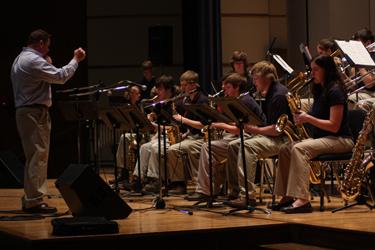Coleman Hawkins festival jazzes WU at White Concert Hall
April 12, 2009
White Concert Hall rang with the sounds of various levels of jazz musicians honing their musical skills all day Friday at the Coleman Hawkins High School Jazz Festival.
The morning and early afternoon were given to high school clinics for thirteen area jazz ensembles. This was followed in the evening by performances from the Washburn University Jazz I Ensemble, and Eric Person’s jazz quartet.
The high school clinics were arranged so that each high school was given time to perform about three pieces.
Judges sat in the back and wrote notes over the performances. Following each of the ensemble’s performance, one of the judges would go with the group into another room where he would take the opportunity to work on rough patches. The three judges were Paul Haar, assistant professor of saxophone and jazz studies at the University of Nebraska-Lincoln; Kurt Gartner, professor of percussion at Kansas State University; and Ray James, director of bands at Baker University.
The students who attended the festival were enthusiastic about the chance to perform and get a reaction from the judges.
“I really appreciated the clinic session,” said Reed McManaman, a Seaman High School student. “We got a lot of positive feedback. There was some good constructive criticism.”
Washburn graduate Cary Stahly, the Seaman High School director, was also positive about his ensemble’s experiences at the festival.
“It gives us another chance to perform for the public,” said Stahly. “It gets us clinician feedback before we perform at other, ranked competitions.”
Stahly said the festival was mostly about developing repertoires the ensembles were already working on.
Several students from Washburn University attended the festival, working in varied roles. Allegra Fisher, a piano performance major, said this is her third year working the front table at the festival. Although she said the festival was good for the high school jazz students because it gave them a chance to perform, it also works well as a recruitment tool.
“I made up my mind to come to Washburn after talking to one of the girls working the front table at a music festival,” said Fisher, who added it was easier to believe a student than the professors. “It seems like you get more of an honest answer from students, sometimes [the other recruitment forums] seem like they’ll say whatever it takes to get you to go,” she said.
Chelsea Loder, an instrumental music education major, attended the festival as part of her course requirements.
“I’m expecting to get some good insight into how to help out when I’m in the field,” said Loder, who confessed to having very little jazz experience.
From the judges’ side of things, Gartner said he doesn’t want judges to be portrayed as mercilessly looking for petty mistakes. He said that, in the experiences of his youth, the judging process, beside the feedback he got, also helped him to develop a sense of community that furthered his career in music.
“We want them to succeed, we don’t want to come off as being scorchers,” said Gartner. “We want to be realistic and helpful.”



